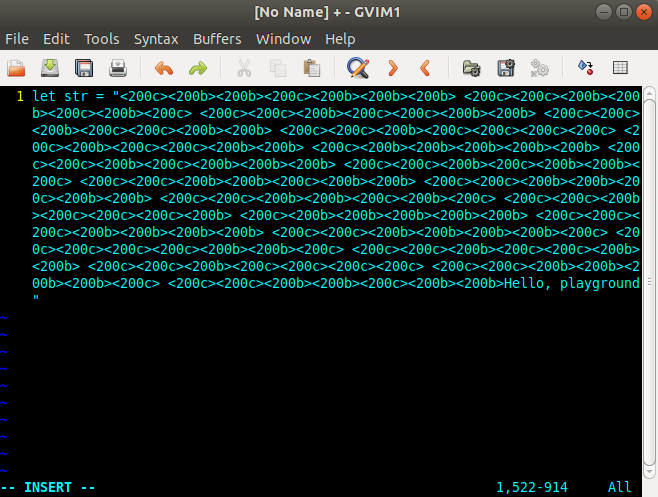Let's see if this works:
//: Playground - noun: a place where people can play
let str = "Hello, playground"
Copy the "Hello, playground" above and decrypt it using Spacecrypt.
Do hidden payloads like this pose a problem for Stack Overflow code fragments?
It appears that these hidden payloads can work their way into code, not just data (such as the string shown above.) For example, this code contains variables which contain the Unicode encoding sequence:
let foo = 111111111
print("foo = \(foo)")
let bar = 111111111
print("bar = \(bar)")
let bar = 1
foo * bar
Both foo and bar are not what they appear to be. The second let bar definition is the give away: the Swift compiler should generate an error, yet this code is completely valid.
I think this poses some serious issues, not just for Stack Overflow, but for the languages which are discussed on this Q&A site. Hidden characters in code make effective code review much more difficult. In the example above, a quick review of the code would lead someone to believe that foo * bar would be 11111111, not the actual value of 12345678987654321. This would be an easy way for someone to hide a security vulnerability in plain sight.
It's also very difficult to see these hidden characters at the point-of-origin: They don't appear at all in Safari's Web Inspector and in Chrome the HTML entities blend right in with the other HTML and CSS for this site. You also have to ask yourself when you last examined the code on this site at this level of detail. We all see stuff that looks useful and copy & paste with abandon.
Should Stack Overflow takes steps to mitigate this situation?
For code, I think it's pretty clear that there should be some kind of filter that strips out this hidden information. Visitors to this site aren't expecting identifiers that use tricks, and if stripping them out breaks the sample code, so be it.
For data, it's a much harder answer: the zero width joiners are a part of the Unicode specification because they have a useful purpose. Maybe my "Hello, playground" string was doing something productive and not encoding a fingerprint. Maybe some kind of visual indicator is needed to let the visitor know that there was more to the data than meets the eye.

